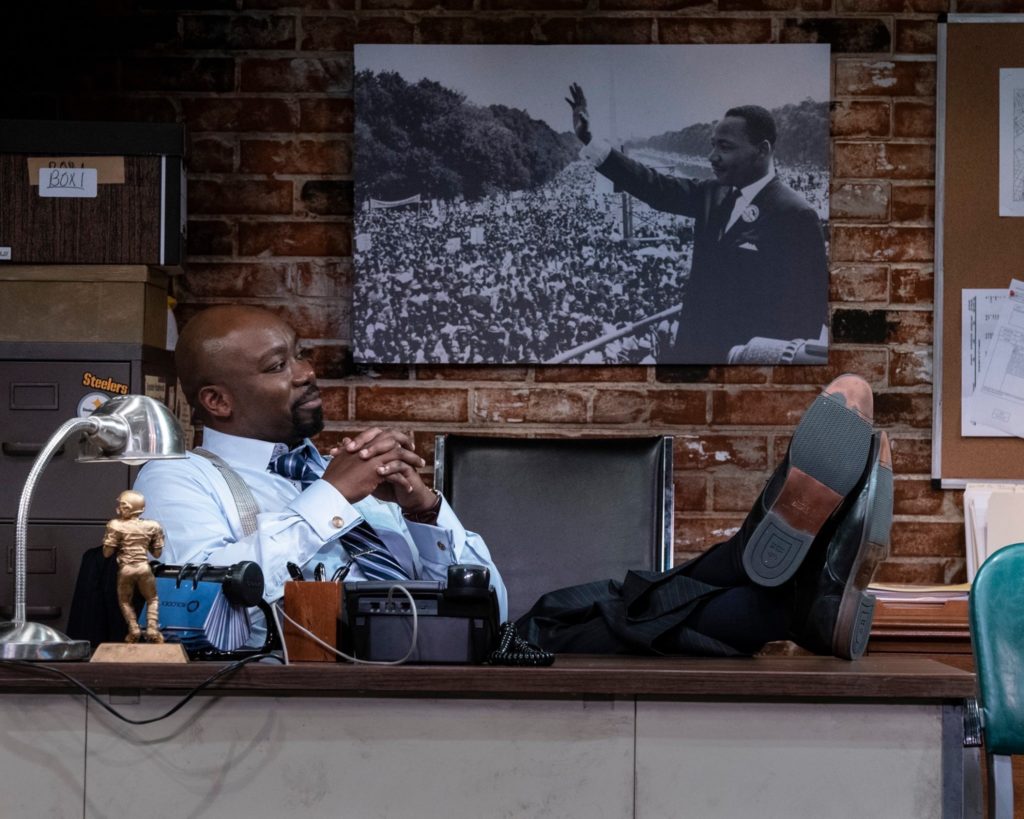Meet Mr. Mangan
By David Cecsarini, Producing Artistic Director
It’s my pleasure to introduce our Next Act audience to Jamil A. C. Mangan, director of Dominique Morisseau’s PIPELINE, coming up next. First, I owe a big Thank You to Renaissance Theaterworks Artistic Director Suzan Fete, who recommended Jamil as a possible director for PIPELINE. He had directed a virtual production for RTW during the pandemic’s early and darker days, and the word was unanimously positive. I believe Suzan put it this way, “He’s great. And a real sweetheart.” And after our initial 90-minute Zoom meeting, I understood.

Mr. Mangan comes to the PIPELINE project with a knowing and experienced perspective on education. Besides his multi-disciplined artistic background – actor, director, musician, vocalist, voice-over artist – Jamil is an arts educator. As such, he has taught for many arts organizations throughout his native east coast tri-state area. He has first-hand familiarity with the challenges faced by schools, administrations, teachers and students, where cultural and societal issues tend to interfere with the chance for a quality education. Chance and a good recommendation had brought me to the perfect director for Morisseau’s PIPELINE. (See Jamil Mangan’s Director’s Statement below.)
Over lunch, I asked Jamil how he came to the theatre world, or did it come to him? A native of Newark, New Jersey, he told me of his family’s affiliation with the Newark area’s only African-American Catholic church. “My grandma was involved in their theatre program. They did musicals a lot; big ones like GUYS AND DOLLS, OKLAHOMA, other ‘war horses.’ And I was taken into New York to see plays; on one such occasion, it was THE PIANO LESSON by August Wilson. I saw people in that play who looked like me and I thought, ‘I can do that.’ I was struck by the power those actors had over their audience and I knew I wanted to feel that for myself.”
Having found his heart’s desire, he charted a well-rounded arts path through Newark Boy’s Chorus, Newark’s Arts High School and University of the Arts in Philadelphia, with time to study musical theatre at Syracuse University and participate as a member of the National Speech and Debate Forensics League.

Jamil’s acting resume reflects an ambitious and well-balanced career of regional, New York and television credits, with an impressive mix of classical and contemporary repertoire. He has found a niche of sorts, in portraying the Rev. Dr. Martin Luther King, Jr., in various iterations such as THE MOUNTAINTOP, MARTIN LUTHER ON TRIAL (MLK appears as a witness) and in the one-man show by Craig Edwards, THE MAN IN ROOM 306. As many talented actors often do, Jamil has gravitated toward directing, marking his debut at Newark Symphony Hall with THE GOSPEL AT COLONUS, an African-American musical adaptation of Sophocles’ tragedy OEDIPUS AT COLONUS. Some directing projects found him traveling to South America, while others have kept him closer to home for institutions such as Young Playwrights of New Jersey and Summer Music Institute. Jamil is also supportive of new work, having recently joined the Board of Seven Devils New Play Foundry, secluded in rural Idaho.
As we waited in my car in line for PCR Covid tests (y’know, like you do these days), we learned our birthdays were just a day apart. “A Libra too!” says Jamil. “My wife’s an Aries. We are complimentary. While I’m weighing my decision yet again, Anna Carol will come in with that often-necessary push to get it done.” Jamil glows from behind his mask as he spontaneously erupts with, “Oh man, I love my wife!” Minutes later, our nostrils thoroughly swabbed, Jamil’s joy was still reverberating as we drove off.

On his website, Jamil’s bio is entitled The Heart of What I Do. He says he lives by the artistic mission once quoted by the playwright Amiri Baraka: artists have a job to do, to raise the consciousness of the community around them. Both statements are indicative of the passion and commitment Jamil has for the theatre and what he’s bringing to PIPELINE. We are in good hands.
And Suzan was right. What a sweetheart.

PIPELINE Director’s Statement
By Jamil A.C. Mangan, Director
PIPELINE is a play that examines the policies, conditions and biases that plague many of our public school institutions. The play is an exposé on how we are failing our Black youth and the collective responsibility we have toward their growth and educational development. Everyone is held accountable for their actions and the roles played in the deterioration of our educational system, creating a path to the industrial prison complex.
Our production takes place in the present, set in an environment representative of most urban high schools across America. Ms. Morisseau uses the poem We Be Cool by Gwendolyn Brooks as a thread throughout the play. The proverbial ‘We’ consists of the youth who feel voiceless, ignored and undesired. We real cool. We left school. We lurk late. We strike straight. These feelings are intimately and passionately channeled through Omari, a Black youth struggling to thrive against great odds.
Throughout the play, Omari lives in a state of subjugation, devoid of a voice, lacking validation; which manifests itself into fear, confusion and exasperation. His deep frustration brings him perilously close to getting pulled in to the school-toprison pipeline, Morisseau’s “namesake” for the play. The scenic elements of our production consist of bleak dull brick or cinder block walls devoid of color. The windows are barred, with barely a faint streak of sunlight leaking into the classroom. The facility is decades old, worn and in need of repair. Though we traverse through many locations (classroom, teachers’ lounge, dormitory, hospital) the design will provide a simple representation of each, allowing the play to move in a fluid, seamless and poetic unfolding of the story.
In our production, Omari’s inner struggles will be revealed within an “Undefined Place”; where he echoes the poem We Be Cool and wrestles with his conflicts. Still and moving images will play a part, showing flashes of students in their rebellion, their rage, their beauty and the complexities of their living experiences.
The stakes are high in PIPELINE. Many of the characters face dire consequences for their actions. They are existing in a heightened state of reality that feels too real, too familiar. The play reminds us that in order to move forward as a society, we must reach back to the students too often left behind.
Tickets for PIPELINE are now on sale at https://nextact.org/shows/pipeline/?tickets. This production is offered live at 255 S. Water Street as well as virtually. Performances run February 10 – March 6, 2022.
